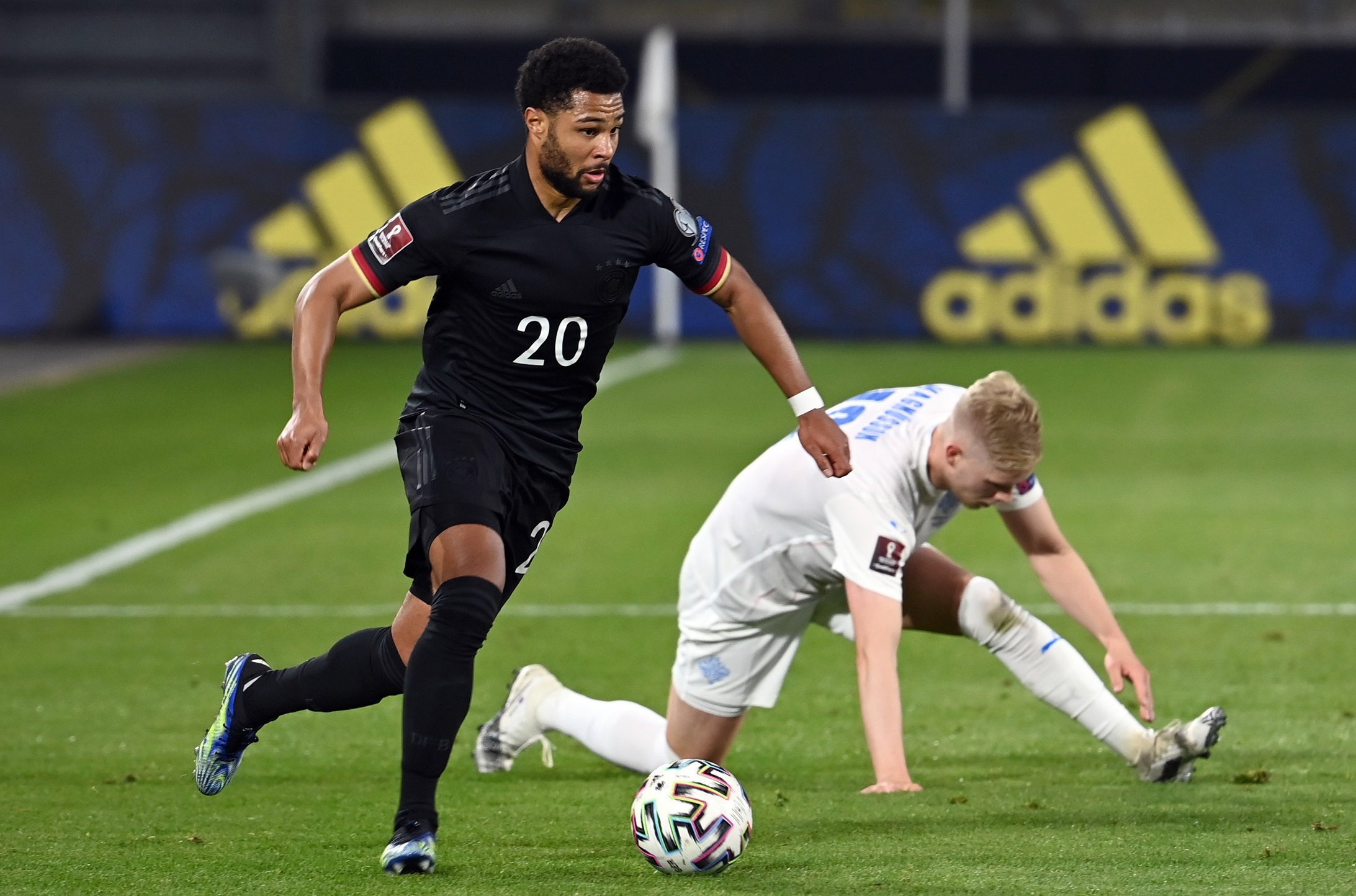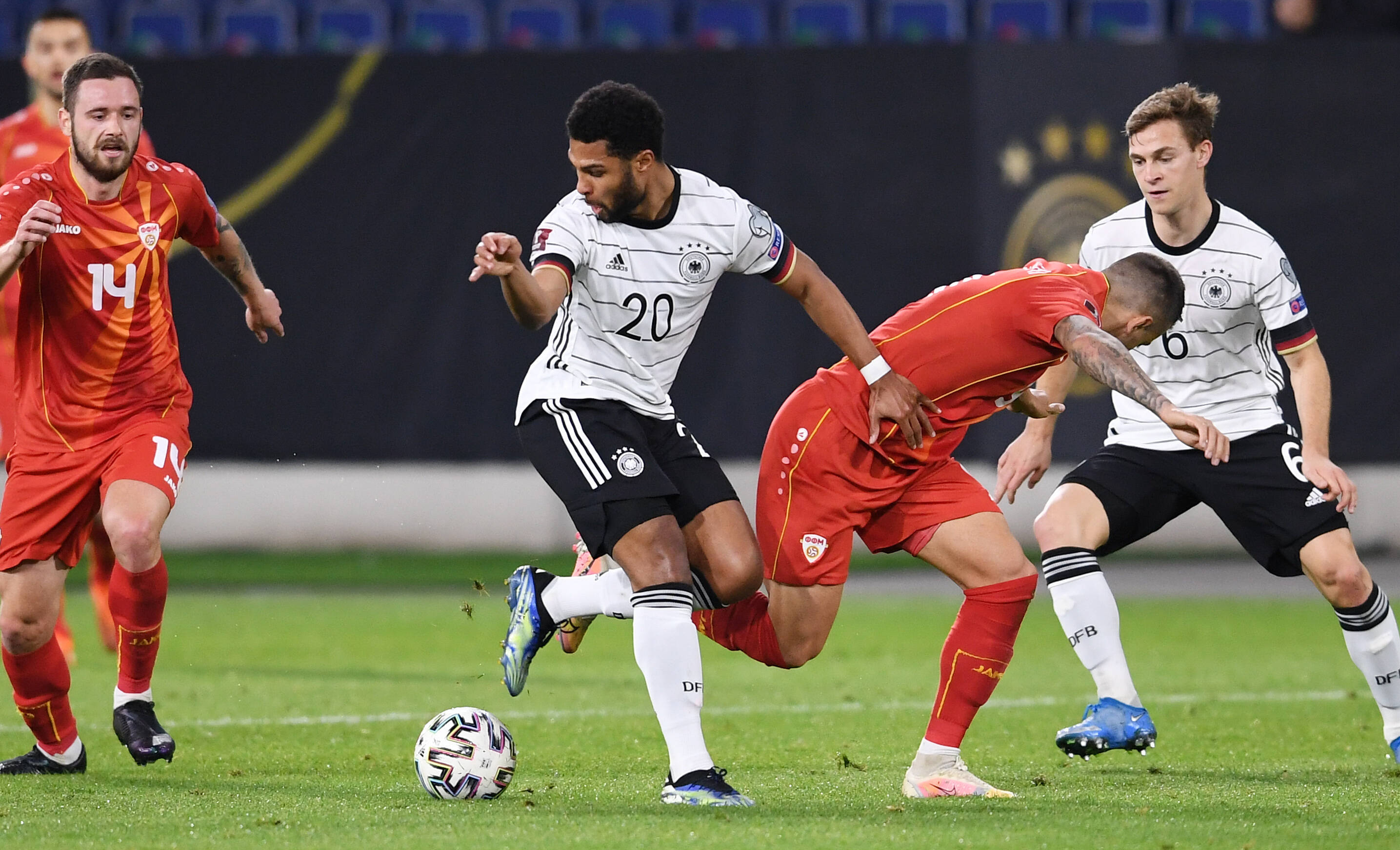The remarkable rise of Germany's Serge Gnabry
Germany have slim hopes of Euro 2020 success, but Serge Gnabry gives them an edge - and the winger's stunning ascent to the top isn't over yet

When Germany named their squad for Euro 2016, Serge Gnabry wasn’t exactly hanging by the telephone.
After all, the winger had made just one Premier League appearance in the 2015-16 season: loaned out to West Bromwich Albion by parent club Arsenal, Gnabry couldn’t get in a team that spent most of the campaign bouncing between 12th and 15th place. Tony Pulis claimed he wasn’t “at that level” required to play for the battling Baggies, and chose to field Craig Gardner or James Morrison out wide instead. Across five months, Gnabry played 12 league minutes. Representing his country was the last thing on his mind.
Fast-forward five years to the following European Championship, and things are just a tad different now. Gnabry looks well-positioned to be among the stars of Euro 2020, having soared to new heights since those peculiar struggles at The Hawthorns. A European champion with Bayern Munich at club level, Gnabry now seeks the equivalent prize with Germany.
DIE MANNSCHAFT Germany Euro 2020 squad profile
To say that their last major tournament appearance didn’t go well, however, is akin to saying COVID-19 has been a slight inconvenience. Joachim Löw’s side went out in the 2018 World Cup’s group stage – the first time since 1938 that Germany, Europe’s most successful nation, had failed to advance beyond the first phase of world football’s biggest competition.
Understandably, miffed supporters and pundits back home called for a shake-up of their dishevelled national side. Instead, the DFB backed the under-fire Löw, and their faith in the long-serving manager – in charge of Die Mannschaft since 2006 – hardly wavered afterwards, even as Germany finished bottom of their UEFA Nations League group in 2018-19 and were thrashed 6-0 by Spain in November 2020. Only in March of this year was a date set for Löw’s eventual departure, after the rearranged Euro 2020.
All of this means there hasn’t been a great deal for Germany’s fans to cheer over the past three years – but Gnabry’s emergence has been a rare highlight. The winger left Arsenal for Werder Bremen seeking regular first-team football in 2016, and it proved to be a good call: by November that year, he had already made his international debut. After just a single season with Werder – a hugely successful one, featuring 11 Bundesliga goals – Gnabry joined Bayern Munich for a cut-price €8 million. If the fee looked good then, it has since turned out to be one of the past decade’s biggest bargains.
Get FourFourTwo Newsletter
The best features, fun and footballing quizzes, straight to your inbox every week.
After a season-long loan at Hoffenheim, Gnabry spotted his moment. With Franck Ribery and Arjen Robben in their final seasons at Bayern, the former Gunner grabbed the baton and ran. His 13 goals and half-dozen assists helped Bayern to win the Bundesliga and DFB-Pokal double, and Gnabry the club’s Player of the Year gong. A penny for some Pulis thoughts.
When Robben and Ribery departed Die Roten the following summer, Gnabry took centre stage. The bustling wideman had bulked up and become much harder to knock off the ball, while his decision-making was much improved from those difficult days in England. He had also developed a handy knack of remaining ice-cool in front of goal. Gnabry was by now regarded as one of the most dangerous forwards on the planet, and he bagged 23 goals and set up 13 more in all competitions as Bayern retained the Bundesliga and became European champions for the sixth time. Things were, it’s safe to say, going pretty well.

But while the Stuttgart-born star hasn’t experienced much adversity in the club game over recent seasons, the same can’t be said for him at international level, where Löw has struggled to get a grip on Germany’s predicament. Having initially been accused of excessive loyalty to his 2014 World Cup winners following the debacle in Russia four years later, the manager surprisingly – and very suddenly – jettisoned Thomas Muller, Mats Hummels and Jerome Boateng into enforced international retirement in 2019. If the idea was to come back stronger with a refreshed team, then that 6-0 beating by Spain – Germany’s worst defeat since 1931 – suggests there is still work to do.
Without Gnabry, however, things would have been even worse. The 25-year-old has been excellent in his outings for the national team, and he went into 2021 with his first 17 caps having yielded a whopping 14 goals. He has quickly become his country’s leading light, and their main hope of silverware this year. If Gnabry doesn’t shine, Germany are highly unlikely to add a fourth European Championship trophy to their collection – or, worse, they may barely make it through the Group of Death into the knockouts.
Gnabry is now very much the modern attacker. He can terrorise defenders on either wing or playing through the middle, and he has featured in all three positions for Bayern this campaign. While naturally right-footed, he has vastly enhanced his left – improvements that didn’t go unseen by his former manager.
“Serge is creative, he can score goals, right-footed, left-footed, [he has] good power, good penetration, [he’s] very, very clever with the timing of his runs,” said Arsene Wenger last year, highlighting the catalogue of qualities held by a player he’d had to sell against his wishes years earlier. “He can be a No.9, a No.10… he’s a very intelligent player.”
That versatility could help Germany. At Bayern he’s primarily deployed on the left, but Gnabry tends to start up front for his country. He hit a brilliant hat-trick from that position in a 6-1 demolition of Northern Ireland in 2019 – one of the team’s best displays since the World Cup. “I’ve always had the highest possible opinion of Gnabry,” beamed Löw after that game. “Right from the start, it was obvious to me that he’d be a fantastically important player.” As Euro 2020 finally approaches, that statement represents an even more accurate assessment of Gnabry’s status within the squad.
Germany find themselves in an unusual position this summer: they are not among the three or four favourites heading into an international tournament. Most of the bookmakers rank Die Mannschaft as the fifth-likeliest victors, behind England, Belgium, France and Spain. A gruesome group stage draw is part of the reason
for that, even though a third-place finish could be enough to send one of Germany, France, Portugal or Hungary through to the knockout stages. Löw’s side will open their campaign with a match that could set the tone for their tournament, one way or the other: they face France, the world champions who knocked them out of Euro 2016 in the semi-finals.
Gnabry wasn’t around for that tussle, having just completed his miserable final season in England. It’s testament to the progress he has made since that he goes into Euro 2020 not only as a member of Germany’s squad, but as their star player.
He might even get a game at West Brom these days, too.
Subscribe to FourFourTwo today and get a FREE England Euro 96 shirt!
READ MORE
WALL CHART Euro 2020 wall chart: Download free with full schedule, fixtures and dates
GROUNDHOPPER Euro 2020 stadiums: Host cities, capacities, and everything you need to know
Greg Lea is a freelance football journalist who's filled in wherever FourFourTwo needs him since 2014. He became a Crystal Palace fan after watching a 1-0 loss to Port Vale in 1998, and once got on the scoresheet in a primary school game against Wilfried Zaha's Whitehorse Manor (an own goal in an 8-0 defeat).

